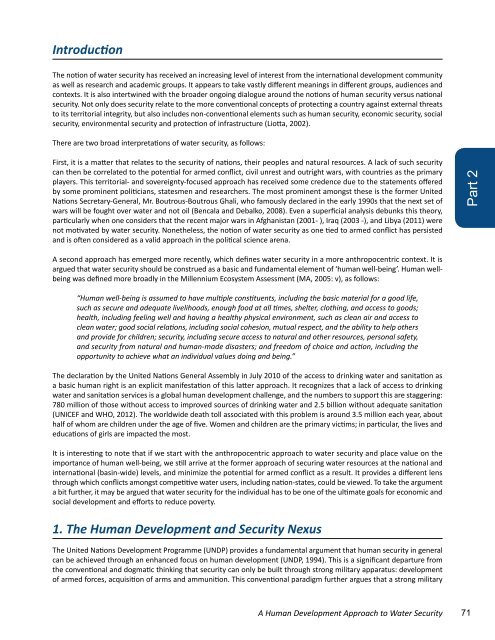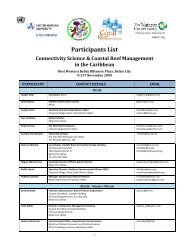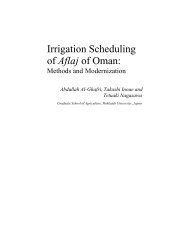The Global Water Crisis: Addressing an Urgent Security - Unu-inweh ...
The Global Water Crisis: Addressing an Urgent Security - Unu-inweh ...
The Global Water Crisis: Addressing an Urgent Security - Unu-inweh ...
Create successful ePaper yourself
Turn your PDF publications into a flip-book with our unique Google optimized e-Paper software.
Introduction<br />
<strong>The</strong> notion of water security has received <strong>an</strong> increasing level of interest from the international development community<br />
as well as research <strong>an</strong>d academic groups. It appears to take vastly different me<strong>an</strong>ings in different groups, audiences <strong>an</strong>d<br />
contexts. It is also intertwined with the broader ongoing dialogue around the notions of hum<strong>an</strong> security versus national<br />
security. Not only does security relate to the more conventional concepts of protecting a country against external threats<br />
to its territorial integrity, but also includes non-conventional elements such as hum<strong>an</strong> security, economic security, social<br />
security, environmental security <strong>an</strong>d protection of infrastructure (Liotta, 2002).<br />
<strong>The</strong>re are two broad interpretations of water security, as follows:<br />
First, it is a matter that relates to the security of nations, their peoples <strong>an</strong>d natural resources. A lack of such security<br />
c<strong>an</strong> then be correlated to the potential for armed conflict, civil unrest <strong>an</strong>d outright wars, with countries as the primary<br />
players. This territorial- <strong>an</strong>d sovereignty-focused approach has received some credence due to the statements offered<br />
by some prominent politici<strong>an</strong>s, statesmen <strong>an</strong>d researchers. <strong>The</strong> most prominent amongst these is the former United<br />
Nations Secretary-General, Mr. Boutrous-Boutrous Ghali, who famously declared in the early 1990s that the next set of<br />
wars will be fought over water <strong>an</strong>d not oil (Bencala <strong>an</strong>d Debalko, 2008). Even a superficial <strong>an</strong>alysis debunks this theory,<br />
particularly when one considers that the recent major wars in Afgh<strong>an</strong>ist<strong>an</strong> (2001- ), Iraq (2003 -), <strong>an</strong>d Libya (2011) were<br />
not motivated by water security. Nonetheless, the notion of water security as one tied to armed conflict has persisted<br />
<strong>an</strong>d is often considered as a valid approach in the political science arena.<br />
A second approach has emerged more recently, which defines water security in a more <strong>an</strong>thropocentric context. It is<br />
argued that water security should be construed as a basic <strong>an</strong>d fundamental element of ‘hum<strong>an</strong> well-being’. Hum<strong>an</strong> wellbeing<br />
was defined more broadly in the Millennium Ecosystem Assessment (MA, 2005: v), as follows:<br />
“Hum<strong>an</strong> well-being is assumed to have multiple constituents, including the basic material for a good life,<br />
such as secure <strong>an</strong>d adequate livelihoods, enough food at all times, shelter, clothing, <strong>an</strong>d access to goods;<br />
health, including feeling well <strong>an</strong>d having a healthy physical environment, such as cle<strong>an</strong> air <strong>an</strong>d access to<br />
cle<strong>an</strong> water; good social relations, including social cohesion, mutual respect, <strong>an</strong>d the ability to help others<br />
<strong>an</strong>d provide for children; security, including secure access to natural <strong>an</strong>d other resources, personal safety,<br />
<strong>an</strong>d security from natural <strong>an</strong>d hum<strong>an</strong>-made disasters; <strong>an</strong>d freedom of choice <strong>an</strong>d action, including the<br />
opportunity to achieve what <strong>an</strong> individual values doing <strong>an</strong>d being.”<br />
<strong>The</strong> declaration by the United Nations General Assembly in July 2010 of the access to drinking water <strong>an</strong>d s<strong>an</strong>itation as<br />
a basic hum<strong>an</strong> right is <strong>an</strong> explicit m<strong>an</strong>ifestation of this latter approach. It recognizes that a lack of access to drinking<br />
water <strong>an</strong>d s<strong>an</strong>itation services is a global hum<strong>an</strong> development challenge, <strong>an</strong>d the numbers to support this are staggering:<br />
780 million of those without access to improved sources of drinking water <strong>an</strong>d 2.5 billion without adequate s<strong>an</strong>itation<br />
(UNICEF <strong>an</strong>d WHO, 2012). <strong>The</strong> worldwide death toll associated with this problem is around 3.5 million each year, about<br />
half of whom are children under the age of five. Women <strong>an</strong>d children are the primary victims; in particular, the lives <strong>an</strong>d<br />
educations of girls are impacted the most.<br />
It is interesting to note that if we start with the <strong>an</strong>thropocentric approach to water security <strong>an</strong>d place value on the<br />
import<strong>an</strong>ce of hum<strong>an</strong> well-being, we still arrive at the former approach of securing water resources at the national <strong>an</strong>d<br />
international (basin-wide) levels, <strong>an</strong>d minimize the potential for armed conflict as a result. It provides a different lens<br />
through which conflicts amongst competitive water users, including nation-states, could be viewed. To take the argument<br />
a bit further, it may be argued that water security for the individual has to be one of the ultimate goals for economic <strong>an</strong>d<br />
social development <strong>an</strong>d efforts to reduce poverty.<br />
1. <strong>The</strong> Hum<strong>an</strong> Development <strong>an</strong>d <strong>Security</strong> Nexus<br />
<strong>The</strong> United Nations Development Programme (UNDP) provides a fundamental argument that hum<strong>an</strong> security in general<br />
c<strong>an</strong> be achieved through <strong>an</strong> enh<strong>an</strong>ced focus on hum<strong>an</strong> development (UNDP, 1994). This is a signific<strong>an</strong>t departure from<br />
the conventional <strong>an</strong>d dogmatic thinking that security c<strong>an</strong> only be built through strong military apparatus: development<br />
of armed forces, acquisition of arms <strong>an</strong>d ammunition. This conventional paradigm further argues that a strong military<br />
A Hum<strong>an</strong> Development Approach to <strong>Water</strong> <strong>Security</strong><br />
Part 2<br />
71




